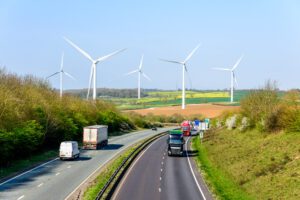
The government’s plans to hit net zero have been comprehensively criticised in a withering report by its own advisers that says targets are being missed on nearly every front.
Fewer homes were insulated last year under the government-backed scheme than the year before, despite soaring energy bills and a cost of living crisis. There is little progress on transport emissions, no coherent programme for behaviour change, and still no decision on hydrogen for home heating.
Meanwhile the installation of new wind and solar farms and the upgrading of the electricity grid are still too slow to meet net zero, according to the Climate Change Committee, which says that the lack of urgency of government and a failure of political leadership means progress has stalled.
Lord Deben, the outgoing chair of the CCC, said the UK had “lost the leadership” on climate action shown at Cop26 in 2021 and done “a number of things” – such as greenlighting a new coal mine and new oil and gasfields in the North Sea – that were “utterly unacceptable”.
He said the committee’s confidence that the government would meet its shorter-term carbon-cutting goals by 2030 was even lower than last year, despite the publication of a new green strategy by ministers. “We’ve slipped behind, and other people have moved ahead,” he said. “This is not a report that suggests satisfactory progress.”
Greenhouse gas emissions have been falling by just under 3% a year, but this will need to double over the next eight years.
The committee warned that the UK could no longer expand any of its airports without closures or shrinking of capacity elsewhere but the government seems not to have accepted this.
Public charging for electric vehicles is more costly than it need be, and the government is expecting transport emissions to be higher than was previously admitted, according to the CCC’s latest annual report, published on Wednesday, entitled Progress in Reducing UK Emissions: 2023 Report to Parliament.
The report also found:
The number of homes receiving energy efficiency improvements under the government’s Energy Company Obligation scheme more than halved, from 383,700 in 2021 to 159,600 in 2022, according to the report. At least 1m to 2m homes should be upgraded each year to meet net zero.
Homes are still being built that will need to be retrofitted with low-carbon heating and efficiency measures, because the government has not yet brought in its promised future homes standard.
No decision on whether to use hydrogen for home heating will be made until 2026, leaving households and boiler companies in limbo.
Emissions from transport have remained stubbornly high as the government has “made a political choice” to allow an increase in road traffic, instead of encouraging people on to public transport.
There is no coherent programme to encourage people to change their high-carbon lifestyles.
There is no clear policy to decarbonise steel production, or emissions from other heavy industries.
Chris Stark, the chief executive of the CCC, said: “What’s missing is the kind of political leadership. You’ve got a series of strings being pushed across government and no one at the top pulling it up to raise it to the political priority that is required. Until that happens, this programme [of reaching net zero] is going to run into the sand.”
Rebecca Newsom, the head of politics for Greenpeace UK, said: “There’s almost no progress in this progress report, just a pitiful catalogue of Rishi Sunak’s climate failures.”
The 438-page annual progress report was the committee’s 15th since the 2008 Climate Change Act, and the last for Deben, a former Conservative environment secretary, who is stepping down after an extended 10-year term as chair. An interim chair, the scientist Prof Piers Forster of Leeds, will take over while a replacement is found.
Deben said ministers could still step up: “What I’m looking for is the leadership which is essential when we are at a moment not just of national emergency, but of global emergency.”
Alok Sharma, the Tory MP who acted as president of Cop26, urged the government to lift the ban on onshore wind, catch up with rival countries on green jobs, and to show leadership internationally, before Cop28, the next UN climate summit, which takes place in November.
“In the global race to attract green investment, jobs and growth the UK risks falling behind without a material response to initiatives from other countries like the US’s Inflation Reduction Act,” he said.
A government spokesperson said: “We can be proud of the UK’s record as a world leader on net zero. We are going far beyond other countries and delivering tangible progress whilst bringing down energy bills, with hundreds of pounds coming off bills from next month.
“The UK is cutting emissions faster than any other G7 country and attracted billions of investment into renewables, which now account for 40% of our electricity. In the last year alone, we have confirmed the first state backing of a nuclear project in over 30 years and invested billions to kickstart new industries like carbon capture and floating offshore wind.
“With a new department dedicated to delivering net zero and energy security, we are driving economic growth, creating jobs, bringing down energy bills, and reducing our dependence on imported fossil fuels.”
Read more:
Government criticised for missing climate targets on nearly every front





